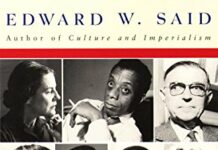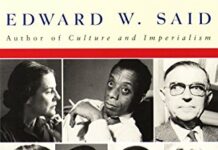
Ebook Info
- Published: 2014
- Number of pages: 434 pages
- Format: PDF
- File Size: 20.62 MB
- Authors: Edward W. Said
Description
A groundbreaking critique of the West’s historical, cultural, and political perceptions of the East that is—three decades after its first publication—one of the most important books written about our divided world. “Intellectual history on a high order … and very exciting.” —The New York TimesIn this wide-ranging, intellectually vigorous study, Said traces the origins of “orientalism” to the centuries-long period during which Europe dominated the Middle and Near East and, from its position of power, defined “the orient” simply as “other than” the occident. This entrenched view continues to dominate western ideas and, because it does not allow the East to represent itself, prevents true understanding.
User’s Reviews
Reviews from Amazon users which were colected at the time this book was published on the website:
⭐Ironically, the great Palestinian-American humanist scholar Edward Said wrote this essentially inaccurate book as a bold and pained cri du coeur two decades before the events of September 11th and the fresh entanglement by the West in the Middle East would render obvious its stature as required reading. One must not attempt to understand our world from the West without a careful listening to the late author’s cry.That sound emerges from a life of `humanistic critique’ of the world’s uniform-izing powers, whether these take academic, governmental, economic, or religious form. Said hopes that the watchword of `liberation’ is in fact an unstoppable and developmental force in history, though he is more resigned than hopeful for results in his generation. `My goal in Orientalism’, he explains, is to use humanistic critique to open up the fields of struggle, to introduce a longer sequence of thought and analysis to replace the short bursts of polemical, thought-stopping fury that so imprison us in labels and antagonistic debate whose goal is a belligerent collective identity rather than understanding and intellectual exchange.’The truth, power, and heuristic value of Said’s argument lie in the contraposition of `individual’ with `collective’ identity. So does its error.The author believes that generalization, labeling, identification of collective or typical behaviors, and the like fundamentally mislead. He is correct about many of them, perhaps most. Yet this fundamentally anarchist principal would make his own work impossible and does not fairly treat the many generalizations about peoples and their struggles that can rightly be made in order to facilitate rather than impede the kind of `understanding’ that Said so admirably desires.In practice, Said is not so inflexible on this point as his theory might suggest. For this reason, he has given us a long book with a lot to say rather than a very short book with just one idea. This happy disconnect between theory and praxis is what makes his book-to say nothing of his body of work-so critical for `Western’ (pardon the generalization and collective identity) people who must somehow come to understand what it is like to be studied, discussed, historically located, conquered, fought, `liberated’, and studied again by people whose `positional superiority’ makes humanistic interaction as peers almost impossible.Said’s `Introduction’ (pp. 1-28) is one of those rare prefatory pieces that actually do justice to the book that ensues. The reading of it is both a joy and a satisfactory orientation to follows.The book itself falls messily into three discursive chapters: `The Scope of Orientalism’ (pp.31-110), `Orientalist structures and Restructures’, and `Orientalism Now’. In the first of these breathtakingly well-read pieces, we are reminded of the Baconian principle that `knowledge is power’. The kind of knowledge produced by the quasi-canonical views of `the Orient’ developed in colonizing Europe and inherited at a late date by an ascendant America is inextricably enmeshed in the exercise of power. It is not innocent knowing, but rather the systematic domestication of a reality that little matches the categories into which it is forced. This knowledge aspires to empirical obviousness, to objectivity, to the status of that which no reasonable (Western or enlightened Eastern) observe could deny. It is a reality in which the knower is indisputably on the side of imperial power and the known is a less fortunate entity over whom empire is justified in advance by the body of knowledge that is abbreviated as `Orientalism’. It is a schematized and theoretical knowledge based on very little interaction with the human objects that come under its purview. It is subordinating and hungry for a classical `fixed point’ in the history of the culture under analysis, a (hopefully) literary moment to which all other encountered aspects and real-time human representatives of that culture can be compared and found wanting.Said argues that such knowledge is a form of paranoia. Illuminated by his anecdotal suggestion that most of our renowned Orientalists did not like the `Orientals’ they met, the claim of paranoia is too important an assertion to be skirted.The author is particularly perceptive in his description of a `textual attitude’ in part IV (`Crisis’) of this first long chapter. For example, `It seems a common human failing to prefer the schematic authority of a text to the disorientations of direct encounters with the human. But is this failing constantly present, or are there circumstances that, more than others, make the textual attitude likely to prevail?’ For Said, there are such circumstances and Orientalism falls victim to both of them. First, `One is when a human being confronts at close quarters something relatively unknown and threatening and previously distant … A second situation favoring the textual attitude is the appearance of success’.On the contrary, Said wants to name and thereby debunk the textual attitude with its false objectivizing, as he asserts in the programmatic statement of the book’s sprawling second chapter (`Orientalist Structures and Restructures’, pp. 111-197): `My thesis is that the essential aspects of modern Orientalist theory and practice (from which present-day Orientalism derives) can be understood, not as a sudden access of objective knowledge about the Orient, but as a set of structures inherited from the past, secularized, redisposed, and re-formed by such disciplines as philology, which in turn were naturalized, modernized, and laicized substitutes for (versions of) Christian supernaturalism.’In this chapter, the author makes his boldest claims about the human deficiencies of the Orientalists: `We are immediately brought back to the realization that Orientalists, like many other early-nineteenth-century thinkers, conceive of humanity either in large collective terms or in abstract generalities. Orientalists are neither interested in nor capable of discussing individuals; instead artificial entities, perhaps with their roots in Herderian populism, predominate. There are Orientals, Asiatics, Semites, Muslims, Arabs, Jews, races, mentalities, nations, and the like …’ In his signature asyndetic prose, Said describes the ironies that immerse the nineteenth-century European traveler to the Orient, who retains his `European power, to comment on, acquire, possess everything around it. The Orientalist can imitate the Orient without the opposite being true.’It is the cumulative, multi-layered power of Orientalism that makes Said consider it a menace rather than an irritation: `Orientalism can thus be regarded as a manner of regularized (or Orientalized) writing, vision, and study, dominated by imperatives, perspectives, and ideological biases ostensibly suited to the Orient … My contention is that Orientalism is fundamentally a political doctrine willed over the Orient because the Orient was weaker than the West, which elided the Orient’s difference with its weakness.’ The academic is sometimes a na?ve and well-meaning complicit: `Formally the Orientalist sees himself as accomplishing the union of Orient and Occident, but mainly by reasserting the technological, political, and cultural supremacy of the West. History, in such a union, is radically attenuated if not banished.’Further, it is the seepage of Orientalist perception out of the academy and into the realm of policy and political power that render it, for Said, a dangerous element and, so, worthy of attention from Said’s powerful pen. The author documents a number of examples in his final chapter.The `Afterword’ included in this 25th-anniversary volume (pp. 329-352) was written in 1994 and provided Said the opportunity to respond to accusations of non-Western bias and (laughably) Islamic fundamentalism. Chiefly, his defense against allegations that he has been partial-in several meanings of the word-is that he had written `a partisan book, not a theoretical machine’. A charitable reading of this defense might well be enough to excuse the author the need to clarify so extensively what he did not intend to say. Yet there is enough truth in the allegation to wish that Said had lived long enough to do justice to his topic by authoring a work on how Muslims (how to avoid a generalization?) have conceived of the West in partial, schematized, and therefore distorted ways that preclude human engagement. Perhaps that was not his vocation. It would have made his body of work less partial and therefore truer.To comment upon Said’s Orientalism is necessarily to indulge in the very type of generalization that he savages in its pages. Yet one can do so with readerly sympathy and even solidarity. His influential book is, in part, a `testament of wounds and a record of sufferings’. History certainly validates the need for such a work. He has provided it with more eloquence, passion, and learning than perhaps any other author who has or might have attempted the same task.It is not difficult to intuit the causes of the dissonance and enmity that arise when Said’s view of the world engages with, say, the `civilizationism’ of Samuel Huntington or the `crisis of Islam’ espoused by Bernard Lewis (against whom Said directs an extended screed). In the former case, the typology must grate, in the latter the reference to a former, classical, and admirable Islam from which the Muslim peoples as we know them today have declined. Though the inevitable caricaturing of such brief description is self-evident, there is enough truth in the abbreviation to justify Said’s alarm, if not his disdain.Probably, the lack of symmetry between the Huntington and Lewis schools on the one hand, and the Said approach on the other, creates a context where Said’s fundamentally inaccurate work can and does ring true. His voice is, to quote an Oriental prophet, not unlike that of `one crying in the wilderness’.It is good to listen to such a voice, though not by shutting out all others. The confrontation of East and West has left victims. Said, before leukemia too early removed him from our company, took up their voice and spoke it without distraction.
⭐This book and Edward Said in general seem capable of generating such intense controversy. Many reviewers of this book seem to forget actually to review the work and focus on attacking Edward Said as a person, many others still forget to review the book and proceed to speak for Palestinian rights and the negative western attitudes of Islam. I will attempt to present an actual review of this book based on MY own reading of it.In Orientalism, Said sets about dismantling the study of the “orient” in general with primary focus on the Islamic Near East. Said argues that concepts such as the Orient, Islam, the Arabs, etc. are too vast to be grouped together and presented as one coherent whole, encompassing all there is to know about the subject. Said bases his view on the shear width and breadth of the subject, the inherent bias of conflicting cultures and more recently the role of the Orientalism in colonialism. It is indeed difficult to attempt to represent a book that is so focused on anti essentialism.Said’s research of western / occidental discourse was very thorough indeed and he does illustrate through repeated examples how misinformation sufficiently repeated can become accepted academic work. Said also presents an analysis of the causes and motives and theorizes about his findings. A lengthy and a times tedious discussion of the origins of Orientalism is rather repetitive and hard to follow for a non specialist like me.Edward Said however seem to have fallen in the same trap he attributes to Orientalism, he has not attempted to explore Arab writings of the periods he discussed nor has he attempted to present (possibly even read) work by Egyptian and Arab historians of the periods he was addressing save for work carried out in the west and within western universities. In doing so, Said fails to see how the modern and contemporary “orient” sees itself through primarily “oriental” eyes such as Ibn Khaldoun, Al Maqrizi and also through the writings of orientalists like Lane. Said also fails to address the work carried out by orientalists based on many manuscripts of Orientals.I particularly enjoyed Said’s analysis of the strong ties that Orientalism has with power and colonialism. Said analysis of the diverging development of the British and French practice based on the latter’s limited success as a colonial power was very enjoyable and very well thought out. The Orientalism Today and indeed the Afterwards section are also very informative and as these were more familiar areas for Said his presentation of ideas and thoughts came across more clearly and the writing was far less tedious than the earlier parts of the book.Orientalism is not an easy read, it will challenge many established views, indeed it has already with a fair degree of success led to changes in the way the Near East is studied. To me, most of all I see this as a book that offers in part a largely coherent explanation for the on-going misunderstanding between the West and the Near East and in Islam. And while Occidentalism does not exist as a field of study in a place like Egypt per se, Said fails to see that the west is viewed largely in terms of its wealth, promiscuous habits, hypocrisy and anti Islam and thus fails to see it as 2 way street, albeit with unequal power.This is by no means a the definitive correction of the history of the Middle East or Near Orient, it is however a very legitimate and serious study of a field of study that no doubt has a lot to answer for!
⭐This book was widely praised when first published, but I found it tough going. The author’s style is orotund in the extreme, with obscure vocabulary, paragraph-long sentences, and page-long paragraphs. He never uses a full stop where he thinks he can get away with semicolon, or a semicolon where he thinks he can get away with a comma. Until I got used to his rhythm, and managed to insert the necessary punctuation in my head, I found myself re-reading every other sentence, just to make sense of them.As for its central thesis, about the condescending, imperialist and racist nature of orientalism – well, yes. Points well made, but did they really need to be made at such length? Perhaps at the time they did, and the author’s range and grasp is impressive, but it all seems rather obvious now.
⭐This book has altered, for the better I think, how I view other people and importantly other cultures. If you are serious about understanding then this is a book for you. We all tend to judge, I did but not know, other people, other cultures according to our own beliefs and ideas, our own perspective. This book has taught me to review my thinking: just because we do something one way it does not mean others who do it differently are wrong. This book for me is the top of the hit parade concerning my education. It’s a difficult read, well not actually difficult, but its certainly not a time filler. It’s a serious book to be read consciously, and carefully considered. You must read it.
⭐Said is an excellent scholar who understands the both the West and East. He clearly deciphers the Western hatred and scepticism towards the East and mainly towards Islam. This work highlights how so called Western scholars demeaned and disrespected the Eastern civilisation. This work shows the Western hatred for the East and there are a plentiful examples of such works in this book.Well worth reading.
⭐This book is a concise beautifully written account of both the origins and the deficiencies in the field of ‘Orientalism’. Said sites numerous sources and includes a generous amount of exerts to back up every point he makes which could make for some very interesting future reads if your that way inclined. I really love this book and the price was also great. Edward W.Said has a factual and at times humorously satirical execution which made the book extremely fun to read. I found myself chuckling at times as Said can be very deliberately funny and always is with elegance and poise. Great book for anyone interested in this topic or just matters of history and the factors which have shaped society. This was delivered speedily and in perfect condition. 🙂
⭐Said’s Orientalism is a masterpiece. It will help you understand current topics such as “culture clash”, “supremacism”, “post-colonialism”. Moreover, Said’s thesis will be valid and key in understanding current tensions in the world and the resulting coming events.
Keywords
Free Download Orientalism in PDF format
Orientalism PDF Free Download
Download Orientalism 2014 PDF Free
Orientalism 2014 PDF Free Download
Download Orientalism PDF
Free Download Ebook Orientalism



